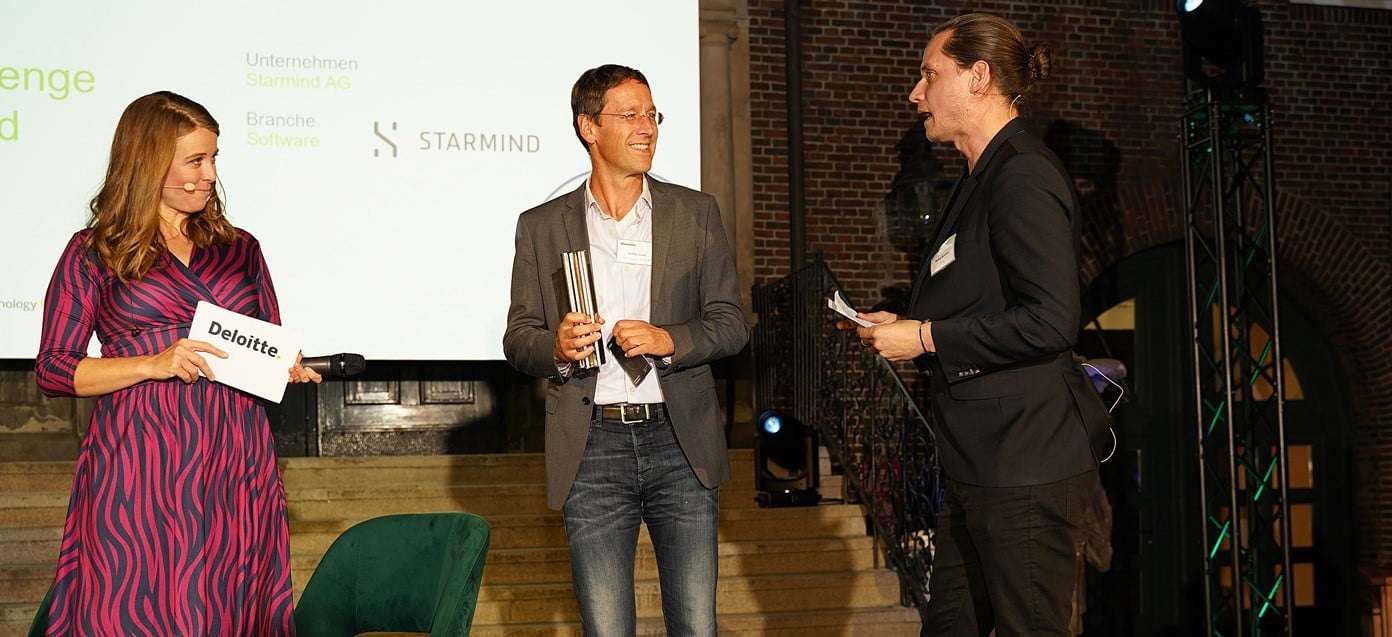Contents
Initially published by Deloitte. As part of receiving the 2019 Deloitte Fast 50 Challenge Award, Starmind's CEO, Oliver Muhr, was interviewed. Take a deeper look at how Starmind is using people-centric AI to augment human intelligence, build skill profiles and identify expertise in this interview.
With the Technology Fast 50 Award, Deloitte honours high-growth technology companies. Starmind AG was awarded the Technology Fast 50 Challenge Award by Deloitte 2019. Oliver Muhr, CEO of Starmind AG, talks in an interview about the vision behind his company, how AI is changing the world of work and what the future of remote work will look like.
Starmind’s AI platform aims to revolutionize the internal knowledge flow in large organizations. Can you please explain how AI can help to augment humans and to identify expert knowledge? And how can not only companies, but also individual employees benefit from this?
Oliver Muhr: Let me give you a little background on Starmind and see how that will help answer this question. There’s a great shift going on in the world. Look at the balance sheets of the biggest companies in world – the S&P 500 and you will find that in the 80s and 90s, the majority of those balance sheets consisted of tangible assets – machines, factories and the like. Fast forward to today, and intangible assets are five times higher than tangible assets. That’s intellectual property, patents, software, all these things being related to humans and human intelligence. We have a simple saying at Starmind: Every company knows the exact laptop configuration of each employee, which model, which hard disk, which processor, but they hardly know anything about the skill of this employee. And so far there has been no solution yet that can assess employee skills – that’s exactly what Starmind does. We build GDPR compliant employee skill profiles. These are based on existing data from the company. We established 200 connectors, from a Teams connector to a Slack connector to many more. From this, our algorithms can build these employee skill profiles. There are three use cases for this.
The first is that we simply serve this information back to the employees – access undocumented intelligence. Just think about it: You work at this great organisation, Deloitte, with about 310.000 employees. What if suddenly you could access all the skills of those colleagues immediately? So that you can find the right information and right colleagues that could help you with a specific task within the enterprise. And that’s exactly what our first use case does. Employees can connect better and figure out how they can benefit from their co-workers knowledge, how they can do their job faster, better and so on.
And there is also the benefit for the company, which is massive. You take all these skill profiles and you aggregate them to develop talent intelligence. Then you literally have a complete view of the skill picture in your organization. In a company like Deloitte, you can do things like workforce planning. You can ask: How many employees with AI skills do I have in the organization? How does the future demand for AI skills look? Do I need to hire people, and how many, to meet this future demand? You can up-skill, re-skill and train more effectively. Every company invests a lot in trainings and courses, but there’s no one who can really say whether that’s effective. If we do courses, the employees are then actually going to use those new skills. And what you can do with Starmind is you’re taking these skill profiles, you look at what has been trained, and you observe whether those skills are coming into the skill profiles based on the knowledge they share or content produced as part of their day-to-day job. And if they do, you have a factual proof that this training and up-skilling initiative works.
And actually, there’s a third use case for this on the company side: access expert intelligence. This is very relevant to a lot of companies. If you quickly need to put together a team, for example if you have a big project, and you know what skill profiles and experiences you need for that – you go again for a query of those skill profiles and identify the right experts within your organisation to be involved. So that’s what we’re doing and have been doing successfully for a while now. Founded in Zürich, we have now offices in Zürich, Frankfurt and New York. We’re active all over Europe and across the US.
So AI can relieve us of a lot of tasks. What role will human intelligence play in the future?
Oliver Muhr: We’re Team Human. We are convinced that no one can fully understand how the human brain actually works. But we all know that this is the best thing, the most complex thing, that exists on earth. If you just look at processing power, one human brain is just so much more powerful than any of those big server farms at Amazon or Google. You just need to feed your brain a few times a day, and it’s working. Think about the energy efficiency, and think about all the energy you need to run these big data servers. We say, AI is here to augment humans, to make humans better, faster, quicker. We’re not expecting a situation where AI will take over humans. Trends like digitalization and AI will enhance the contribution employees can have, and if you look at this on a macro level, these things actually generate new jobs. There is a study from the World Economic Forum that says digitalization will impact 75 million jobs. But it will actually create 125 million new jobs. And then the question is, isn’t that positive? We need more people, we need more humans. What we need to do is train and re-skill them. The focus should be on training and re-skilling, and not on fear. And that’s certainly also the position that we’re taking as a company.
A quick question about how AI taps into the resource pool of the organization. Would you say human experience and a human touch are still important in the future?
Oliver Muhr: Always. You see these stories in the news about robots that can jump or computers that are beating humans at chess. These are highly trained algorithms, trained for that specific case. But there are things in us humans that machines can’t do. There’s ingenuity, there’s transfer knowledge. It is about seeing that now that I’ve learned something new, I can make some slight adjustments and then I can use that optimized approach to solve a new challenge. Humans and their brains will be way more powerful than machines for all the time we will be alive, and our children too. It’s all about augmenting human intelligence rather than replacing it.
In your opinion – what will be the impact for the Future of Work and remote collaboration?
Oliver Muhr: You know, the COVID-19 situation, fully shifted the whole work-from-home movement by at least 10 to 15 years. If you look at start-ups, working from home is and has been the normal. There are start-ups and scale-ups that have 2.000 employees without an office. For younger companies like us, it was easy to switch to remote work during the lock-down as our people are distributed around the whole world anyway. But for the big companies, it’s different. At the beginning of the crisis, some of these companies didn’t have the infrastructure to have their employees working remotely. Now they do. And now they see that it’s working. Employees also see it’s actually ok. I don’t have to do this one-hour commute every day and back. I had meetings with different customers, three in a day, that would usually take me three to four days because they’re in completely different time zones. There’s a massive productivity increase, and we think that the pandemic just accelerated this trend by 10 to 15 years. Going forward, about 20% plus of all employees will just work from home. The trust is there from the big corporations. They see that productivity increases. And so do the employees, too.
But, the first level is that these companies plugged in to those collaboration systems like Teams, Slack or Skype as they needed to go remote fast. And that is just to keep the communication up. You need a way to talk and have a meeting. What we think is now starting is the next phase. In a nutshell, these solutions are really just enabling people to communicate. What you need now is the intelligence about who you should be talking to from your home office, and how you can access people and skills of the company that you’ve never known before. And these people could actually help you. You need an intelligence layer like Starmind even more if you have a more distributed workforce. And that’s certainly what we see with our customers. They have Teams and Slack and all that, but now they’re looking for that intelligence layer for these networks that connect their employees. So that they can supercharge their productivity in these times.
How is innovation promoted and implemented in your company?
Oliver Muhr: We are a small but very fast-growing company. We live and breathe innovation. Everything we do is tied to it: re-inventing ourselves, making us better, quicker and faster. Every one of our employees has a direct impact on how Starmind is growing, and where we’re growing. It doesn’t matter if it’s an engineer, a data scientist or sales rep. Our culture is bound to innovation. We need to innovate constantly. As we grow, we get access to new markets, we see new opportunities, things we can capitalize on. And that’s the DNA of the company.
Starmind is a high-growth scale-up with tier 1 customers. For all startups, beginnings are difficult. What do you think are the biggest challenges for startups and how can they tackle these?
Oliver Muhr: I think if you start a company, there are a couple of factors that you need to consider because they impact your future success. It’s about a combination of team, product, market. And of course financing. You do all this with a very strict budget in the beginning, and then scale. Once you get your first financing round, your first investors and venture capital firms, it’s just a matter of hitting the gas, scaling and growing. There are those phases that every company needs to go through, and every phase is different. That is the journey you have to grow your company . We are a global company now. We started at the University of Zürich with two people. It is amazing to see and to live through that evolution.#
In 2019, you were honoured as winnner of the Deloitte Technology Fast 50 Challenge Award. What motivated you to participate in this competition, and what effect did the award have on your company?
Oliver Muhr: We were thrilled and excited to be given this award. Deloitte is a huge name in the business. Deloitte Fast 50 and your other awards have a big weight. That helps us in two ways. Number one is market access: to get access to customers and prospects through Deloitte channels. And the second benefit is to gain more visibility within Deloitte. We’ve had multiple meetings and follow-ups with colleagues of yours to discuss how we can grow together, how we can approach our customers together. How can we do that internally at Deloitte? Deloitte is now a customer of Starmind. So far it has been very positive – the traction, the outside validation, the credibility of being awarded such an honor.



